Ongoing Onboarding: How Duolingo Introduces New Skills
Continue to Ongoing Onboarding: How Duolingo Introduces New Skills…
Do you look up directions on your phone? Do you rely on your phone to be able to look up key information like your bank balance? Do you check Facebook while waiting in line or on the elevator? Smartphones have become so interwoven into our world that it’s difficult to imagine life without them.
Yet, the iPhone was first introduced less than six years ago! Mobile web usage has taken off at a staggering pace since then, and just keeps increasing. New mobile devices are introduced into the market practically every day.
Not long ago, mobile-friendly sites were considered a nice-to-have enhancement. But nowadays, the need to reach users across various screens sizes and platforms is an undeniable imperative to doing business.
We've pulled together some mobile statistics to help illustrate how important mobile devices have become in our interactive world.
The average person looks at their mobile phone 150 times a day. That works out to once every 6.5 minutes for every waking hour (average awake time is 16 hours per day).
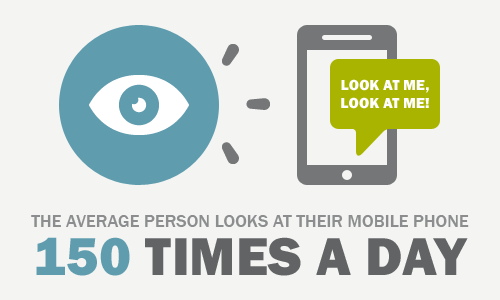
DATA SOURCE: Tech Central
Mobile Internet usage is ramping up substantially faster than desktop Internet usage did. Globally, mobile Internet usage has grown by 36% since 2011. In comparison, desktop Internet usage grew 10% in that time period. In the next two years, it is estimated that mobile Internet usage will grow by another 26%. At this rate, mobile Internet usage is projected to overtake desktop Internet usage by 2014.
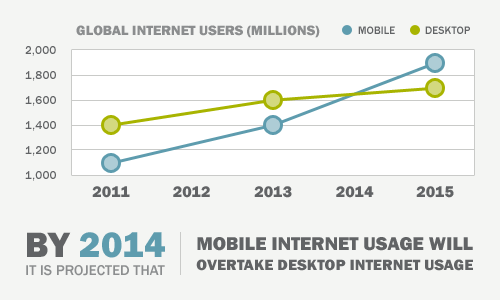
DATA SOURCE: Business Insider
There are 700,000 Android devices activated per pay. There are also 562,000 iOS devices (iPhones, iPads, and iPod Touches) sold per day. Add those together, and you have a total of 1.27 million mobile devices entering the market every day. By comparison, there are 371,000 babies born every day.
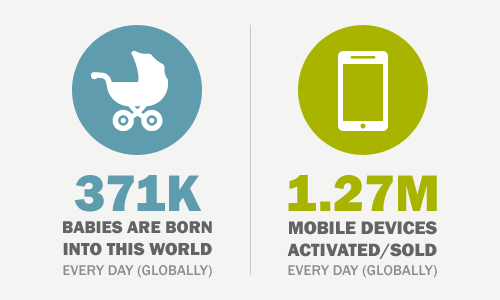
DATA SOURCE: Luke Wroblewski
In 2009, only 18 percent of mobile subscribers had smartphones. By the end of 2012, the number of mobile subscribers that had a smartphone nearly tripled.
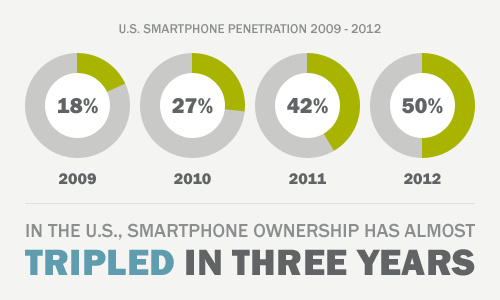
DATA SOURCE: Nielsen
Users expect their mobile experience to be as good as their desktop experience. A bad mobile experience with a brand can lead to frustration, and can harm an opinion of a brand overall.
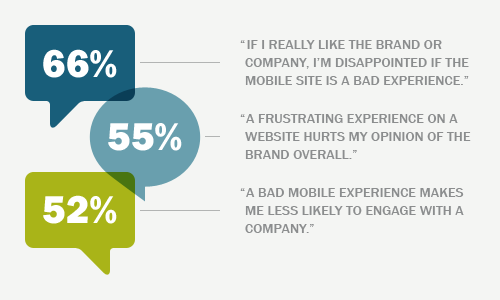
DATA SOURCE: Google
Users expect websites to load as quickly (or faster) on their phones than on their home computers or laptops. Nearly 60% of web users say they expect a website to load on their mobile phones in 3 seconds or less, and 74% are only willing to wait 5 seconds or less for a single web page to load before leaving the site.
What happens if it doesn’t load quickly? They leave. And possibly go to your competitor’s site. Or call your call center for the information they were looking for. Either way, when a site’s load time isn’t optimized for mobile, it’s never good for the bottom line.
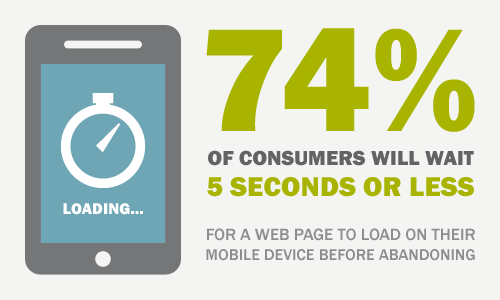
DATA SOURCE: Gomez
The average length of time spent on mobile-optimized sites is five minutes, which is two minutes longer than the average visit to sites without a mobile web presence. That bears repeating: TWO MINUTES LONGER. Think about how long two minutes is – what a person could learn or read or do on your site in two minutes – and you’ll realize why being optimized for mobile matters.
Furthermore, consumers who visit a site that is mobile-optimized looked at an average of 19 pages per person – 33% more than if the site was not mobile-optimized (12 pages).
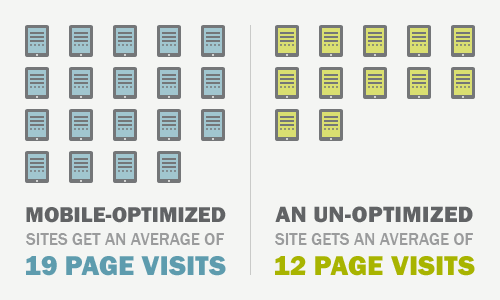
DATA SOURCE: IAB
Mobile devices have reached critical mass, with a majority of consumers in both developed and high-growth economies now owning a mobile phone as of the first half of 2012 (smartphone, multimedia phone, and/or feature phone). Smartphone owners may be the majority of mobile users in countries like the U.S. and U.K., but growth is seen worldwide. The illustration below shows smartphone ownership by various countries for 2012.
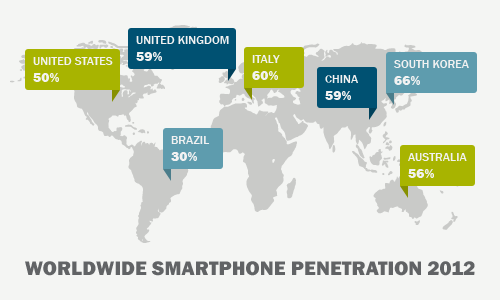
DATA SOURCE: Nielsen
As users continue to gravitate towards using their mobile devices to go online, the need for mobile-friendly sites will become imperative. Does your business have a mobile strategy in place? If not, it is time to get started.
At Crux Collaborative, we have helped create mobile experiences for our clients ranging from native app designs and prototypes, m-dot sites, and responsive web design (RWD) sites. Contact us to learn more about how we help our clients optimize their mobile experiences. We'd love to help you get off to the right start, or optimize what you already have.
Continue to Ongoing Onboarding: How Duolingo Introduces New Skills…